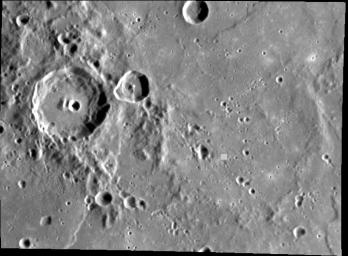The small green square in this image marks the point at zero degrees latitude and 180° longitude on Mercury's surface. This is one of Mercury's two "hot poles." The other is at 0° latitude and 0° longitude. Mercury's eccentric orbit and spin-orbit coupling combine so that one or the other of these "hot poles" points toward the Sun when Mercury passes closest to the Sun in its orbit, and the Sun is overhead longer at these points than anywhere else on the planet. Therefore, the "hot poles" receive about two and one-half times more solar radiation than the 90° and 270° longitudes and hence get much hotter. Since Mercury's rotation axis has essentially no tilt relative to its orbital plane (unlike the Earth, which has a tilt of 23°), Mercury does not have true seasons. But depending on the location, portions of the surface experience hotter "summers."
This image was acquired as part of MDIS's high-resolution surface morphology base map. The surface morphology base map will cover more than 90% of Mercury's surface with an average resolution of 250 meters/pixel (0.16 miles/pixel or 820 feet/pixel). Images acquired for the surface morphology base map typically have off-vertical Sun angles (i.e., high incidence angles) and visible shadows so as to reveal clearly the topographic form of geologic features.
The MESSENGER spacecraft is the first ever to orbit the planet Mercury, and the spacecraft's seven scientific instruments and radio science investigation are unraveling the history and evolution of the Solar System's innermost planet. Visit the Why Mercury? section of this website to learn more about the key science questions that the MESSENGER mission is addressing. During the one-year primary mission, MDIS is scheduled to acquire more than 75,000 images in support of MESSENGER's science goals.
Date acquired: May 06, 2011
Image Mission Elapsed Time (MET): 213152532
Image ID: 218678
Instrument: Narrow Angle Camera (NAC) of the Mercury Dual Imaging System (MDIS)
Center Latitude: 0.37°
Center Longitude: 179.2° E
Resolution: 265 meters/pixel
Scale: The scene is about 182 km (113 mi.) wide
Incidence Angle: 67.5°
Emission Angle: 43.2°
Phase Angle: 110.8°
These images are from MESSENGER, a NASA Discovery mission to conduct the first orbital study of the innermost planet, Mercury. For information regarding the use of images, see the MESSENGER image use policy.

 Planetary Data System
Planetary Data System












